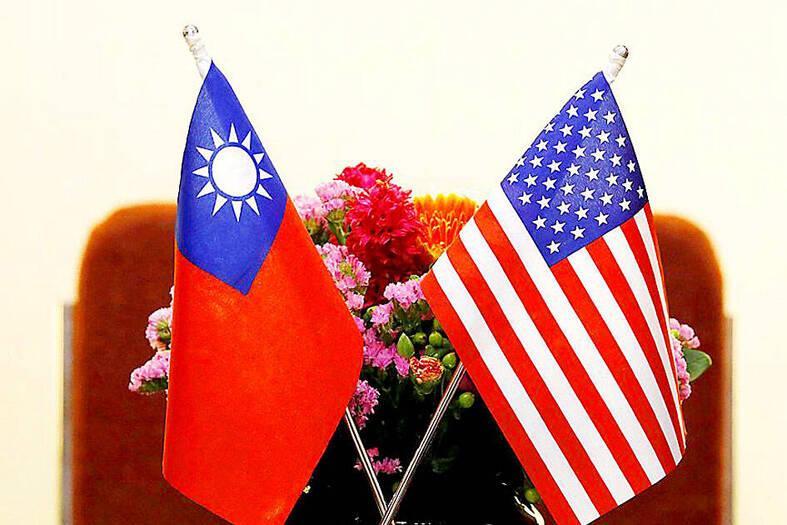The US issued its first batch of tariff notification letters yesterday, although Executive Yuan spokesperson Michelle Lee (李慧芝) today confirmed Taiwan has yet to receive one.
Vice Premier Cheng Li-chun (鄭麗君) and Minister Without Portfolio Yang Jen-ni (楊珍妮), who leads the Executive Yuan's Office of Trade Negotiations, are currently in the US negotiating on the tariff issue, the Executive Yuan said today.
In April, the US announced a 32-percent tariff in Taiwan, although it later announced a 90-day postponement period to negotiate a trade agreement.

Photo: Reuters
Fourteen countries, most notably Japan, South Korea, Malaysia, Indonesia and Thailand, received letters notifying them of new tariff rates starting on Aug. 1, with the threat that retaliatory tariffs would lead to even higher rates.
Tariff rates for South Korea, Japan and Malaysia were set at 25 percent, 32 percent for Indonesia and 36 percent for Thailand.
An anonymous source said that the high tariff rates for this first group of countries are examples of negotiations stalling, failing or having been deemed unnecessary to continue.
The US has reportedly indicated that negotiations with Taiwan are progressing positively, the source said.
In a statement issued today, the Ministry of Foreign Affairs said that Taiwan and the US are currently engaged in discussions on tariffs and that the country continues to seek the best outcome in negotiations.
Developments would be announced to the public when available, the ministry said.
The Presidential Office today said that President William Lai (賴清德) had a video call with the negotiating team late last night.
In a 50-minute call, Lai expressed his gratitude for their months of work on trade discussions, Presidential Office spokesperson Karen Kuo (郭雅慧) said.
Lai emphasized that Taiwan has always sought to maintain positive relations with the US based off mutual benefit and has hope the negotiations would both balance trade and strengthen cooperation between the two countries, Kuo said.
The core mission of Taiwan’s negotiators is to safeguard national interests, public health and food security, Lai told them, Kuo said.
Taiwan’s exclusion could be an indication of positive developments in ongoing discussions between Taiwan and the US, political pundit and former Taiwan People's Party member Grace Woo (吳靜怡) said today in a Facebook post.
Hopefully, lawmakers in the Legislative Yuan understand the importance of strengthening US-Taiwan relations, Woo said, adding that Taiwan’s status as a democratic partner should help it ensure it is not “punished.”
Additional reporting by Huang Ching-hsuan and Chung Li-hua

Taiwanese can file complaints with the Tourism Administration to report travel agencies if their activities caused termination of a person’s citizenship, Mainland Affairs Council Minister Chiu Chui-cheng (邱垂正) said yesterday, after a podcaster highlighted a case in which a person’s citizenship was canceled for receiving a single-use Chinese passport to enter Russia. The council is aware of incidents in which people who signed up through Chinese travel agencies for tours of Russia were told they could obtain Russian visas and fast-track border clearance, Chiu told reporters on the sidelines of an event in Taipei. However, the travel agencies actually applied

Japanese footwear brand Onitsuka Tiger today issued a public apology and said it has suspended an employee amid allegations that the staff member discriminated against a Vietnamese customer at its Taipei 101 store. Posting on the social media platform Threads yesterday, a user said that an employee at the store said that “those shoes are very expensive” when her friend, who is a migrant worker from Vietnam, asked for assistance. The employee then ignored her until she asked again, to which she replied: "We don't have a size 37." The post had amassed nearly 26,000 likes and 916 comments as of this

New measures aimed at making Taiwan more attractive to foreign professionals came into effect this month, the National Development Council said yesterday. Among the changes, international students at Taiwanese universities would be able to work in Taiwan without a work permit in the two years after they graduate, explainer materials provided by the council said. In addition, foreign nationals who graduated from one of the world’s top 200 universities within the past five years can also apply for a two-year open work permit. Previously, those graduates would have needed to apply for a work permit using point-based criteria or have a Taiwanese company

The Shilin District Prosecutors’ Office yesterday indicted two Taiwanese and issued a wanted notice for Pete Liu (劉作虎), founder of Shenzhen-based smartphone manufacturer OnePlus Technology Co (萬普拉斯科技), for allegedly contravening the Act Governing Relations Between the People of the Taiwan Area and the Mainland Area (臺灣地區與大陸地區人民關係條例) by poaching 70 engineers in Taiwan. Liu allegedly traveled to Taiwan at the end of 2014 and met with a Taiwanese man surnamed Lin (林) to discuss establishing a mobile software research and development (R&D) team in Taiwan, prosecutors said. Without approval from the government, Lin, following Liu’s instructions, recruited more than 70 software